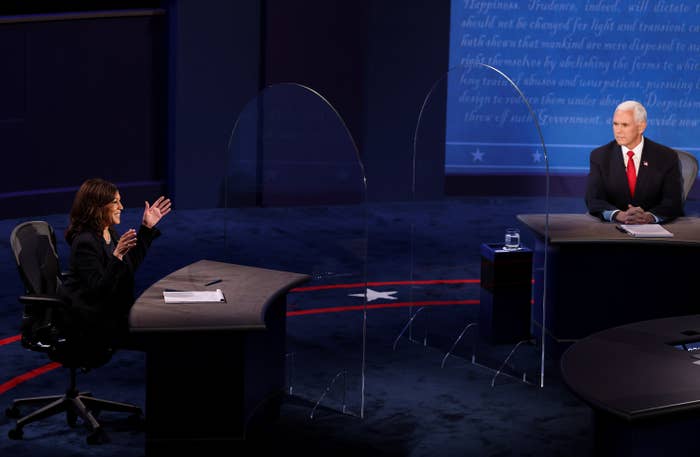
Sen. Kamala Harris and Vice President Mike Pence steered clear of the chaos of the past 10 days — avoiding questions about their running mates’ health and age, and about the president contracting COVID-19 and his hospitalization.
Since the first presidential debate on Tuesday of last week, the United States has been submerged in a nonstop series of events: The president, first lady, top military figures, sitting senators, and at least a dozen people connected to the White House have tested positive for the coronavirus, ultimately sending Trump in and out of Walter Reed between then and now.
But beyond a brief exchange about the Rose Garden event announcing Amy Coney Barrett’s nomination to the Supreme Court, an event which Pence defended, neither candidate addressed much about these current events.
Unlike most vice presidential debates of the modern era, this one featured two candidates who might become president or need to assume the duties of the office — a hard reality of a viral pandemic that has disproportionately affected older men.
At 77 and 74, respectively, Biden and Donald Trump are already the oldest presidential candidates in US history (Ronald Reagan was 73 in 1984). The delicate nature of their ages has been underlined by the last week, in which Trump entered and exited the hospital with the coronavirus, which has spread rapidly through the White House staff and political Washington. For days since the last debate, the campaigns have traded arguments about safety precautions for this debate — settling at a 12-foot distance and plexiglass separating the candidates, a visual reminder of the bizarre and terrible time we’re living in.
But neither Pence, 61, nor Harris, 55, answered very clearly when asked about the potential transfer of power to either of them, nor about the conversations they’ve had with their respective running mates. Harris seemed to deliberately avoid criticizing much about Trump’s heath, and the events preceding and following his positive diagnosis — a notably chaotic time in a country that now knows political chaos well.
In fact, the debate spent only 15 minutes specifically focused on the virus that has spread across the country and killed more than 210,000 Americans.
The two candidates offered vividly different pictures of the state of the pandemic in the United States. Harris painted the Trump administration’s response to the pandemic as inadequate and repeatedly mentioned the number of Americans who have passed away from COVID-19 and the vice president’s role as the chair of the White House’s Coronavirus Taskforce.
“Whatever the vice president is claiming the administration has done, clearly it hasn't worked. When you're looking at over 210,000 dead bodies in our country, American lives, that have been lost, families that are grieving that loss,” Harris said.
Harris repeatedly returned to the timeline that the Trump administration had to respond to the virus, appealing directly to voters about what they could have done if they’d had information about the virus sooner than it had been provided by White House officials.
“Can you imagine if you knew on Jan. 28, as opposed to March 13, what they knew, what you might have done to prepare?” Harris asked.
“This administration stood on information that if you had as a parent, if you had as a worker knowing you didn't have enough money saved up and now you're standing in a food line because of the ineptitude of an administration that was unwilling to speak the truth to the American people,” she later added.
Pence painted a rosier picture of the administration’s response to the virus and glazed over the president’s diagnosis and failure to follow his own Centers for Disease Control’s recommendations.
“President Trump and I have great confidence in the American people and their ability to take that information and put it into practice,” Pence said.
He added that he and the president trusted the American public to follow recommendations and attacked the Biden campaign for suggesting a national mask mandate, a measure that former vice president Joe Biden has repeatedly mentioned that he would have instituted since the start of the pandemic.
Mostly, though, the candidates criticized each other’s records, and those of Trump and Biden, sharply but in measured, practically dulcet tones compared to last week’s nearly incomprehensible debate between Trump and Biden. They actually have very different views, talking about policing (Harris argued for reform, Pence defended police), fracking (Pence said Biden would ban fracking, Harris said he wouldn’t), and climate change (Pence tersely said the climate was changing, Harris talked about the issue as an existential threat). But in an election where nearly everyone seems to have already decided, the contrast with last week stood out. Although Pence repeatedly continued speaking when moderator Susan Page kept trying to cut him off when he went over time, and twice answered the previous question, neither candidate raised their voice in any particular way. Even when the candidates were ostensibly calling each other liars and criticizing each of their records deep into the past (on auto bailouts and prosecutions), it remained civil.
Even the last question of the debate — a letter from an eighth-grader in Utah — gestured at the more subdued event. “When I watch the news, all I see is citizen fighting against citizen,” the questioner wrote. “When I watch the news, all I see are two candidates from opposing parties trying to tear each other down. If our leaders can't get along, how are the citizens supposed to get along?”
In a pool report from one of the reporters covering the event, a University of Utah student noted the distinction: “It was a lot more muted than the presidential debate.”

